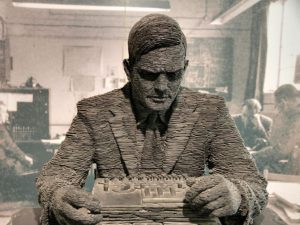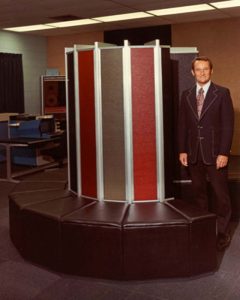already mentioned
What is Rear Admiral Grace Hopper famous for?
 Grace Hopper was an excellent mathematician and one of the first “encoders”, so-called programmers. In the mid-twentieth century, she, as an officer of the US Navy, like everyone who was “close” to computers, worked at Harvard in the department that was engaged in obtaining ballistic tables for artillery tasks.
Grace Hopper was an excellent mathematician and one of the first “encoders”, so-called programmers. In the mid-twentieth century, she, as an officer of the US Navy, like everyone who was “close” to computers, worked at Harvard in the department that was engaged in obtaining ballistic tables for artillery tasks.
So Grace Hopper is considered one of the first programmers in the world: she worked on the computer of Mark I, the former, in fact, a giant calculator. The giant Mark I was intended for the computational processes of obtaining artillery ballistic tables, in the already written algorithm, mathematical tasks (modules) of a general nature were provided. Hopper and her colleagues (by the way, there were much more female programmers involved in coding than men) coped with this – they first applied Continue reading
How to get a Turing Award?
 The most famous scientific award in the world is undoubtedly the Nobel Prize. It was founded by the famous industrialist and inventor Alfred Nobel (Alfred Bernhard Nobel; 1833 – 1896). The prize has been awarded since 1901 for outstanding achievements in the field of natural sciences: physics, chemistry, biology or medicine.
The most famous scientific award in the world is undoubtedly the Nobel Prize. It was founded by the famous industrialist and inventor Alfred Nobel (Alfred Bernhard Nobel; 1833 – 1896). The prize has been awarded since 1901 for outstanding achievements in the field of natural sciences: physics, chemistry, biology or medicine.
Two more Nobel Prizes are awarded for achievements in the humanitarian fields: for achievements in the field of literature and for the efforts made in the fight against wars on the planet. Starting from 1969, at the same time with the five prizes listed, another one is awarded – for achievements in the field of economics. The money for the fund from which this premium is paid is allocated by the State Bank of Sweden. Therefore, the prize in economics is called not the Nobel Prize, but the Nobel Prize Continue reading
How did Seymour Cray build supercomputers?
 Elite customers bought the first supercomputers – the Atomic Energy Commission and the Weather Bureau. For three years, 63 CDC 6600 computers were sold, these computers worked in major US academic institutions. But there are no limits to the best … Seymour CrayFoto: Source In 1968, the CDC 7600 supercomputer was released, which was then again the fastest computer in the world. The clock frequency of its central processor was 36 megahertz (the clock frequency of a modern commercial personal computer is a thousand times higher). A total of 50 of these computers were sold. Few? But we should not forget that the supercomputer both then and now is a very expensive car, they are bought individually. Therefore, this market is quite limited. The next model, the CDC 8600, was made, but they did not release it to the market. Having gained a position in the world of business, the company began to expand and promote more profitable commercial projects. Reckless youth ended, the usual work began, in many ways routine. Life was to become prosperous, but boring. We are moving to a new building: the housing problem spoiled the Muscovites … but not the Petersburgers! We are looking for special mortgage conditions on the St. Petersburg Real Estate website and begin to plan our new life in a new area of the city. Recommended St. Petersburg Real Estate Cray realized that he had to leave in order to make a new take-off. Continue reading
Elite customers bought the first supercomputers – the Atomic Energy Commission and the Weather Bureau. For three years, 63 CDC 6600 computers were sold, these computers worked in major US academic institutions. But there are no limits to the best … Seymour CrayFoto: Source In 1968, the CDC 7600 supercomputer was released, which was then again the fastest computer in the world. The clock frequency of its central processor was 36 megahertz (the clock frequency of a modern commercial personal computer is a thousand times higher). A total of 50 of these computers were sold. Few? But we should not forget that the supercomputer both then and now is a very expensive car, they are bought individually. Therefore, this market is quite limited. The next model, the CDC 8600, was made, but they did not release it to the market. Having gained a position in the world of business, the company began to expand and promote more profitable commercial projects. Reckless youth ended, the usual work began, in many ways routine. Life was to become prosperous, but boring. We are moving to a new building: the housing problem spoiled the Muscovites … but not the Petersburgers! We are looking for special mortgage conditions on the St. Petersburg Real Estate website and begin to plan our new life in a new area of the city. Recommended St. Petersburg Real Estate Cray realized that he had to leave in order to make a new take-off. Continue reading




